Let’s Talk Gravel. How Much Do You Need for Your Batting Cage Sub Base?
Published August 16, 2024
This post is 0% AI Generated.
Updated January 21, 2025
We are often asked “How much stone do I need for a good sub base?” It’s a common question from DIYers installing batting cages in their backyards. So we thought we would explain it in an article.
Contents:
- Table 1: Tons of Gravel Needed by Batting Cage Size
- Why 4 Inches Deep?
- What specific kind of gravel is best?
- Crushed Rock Base.
- Driveway Gravel
- Crusher Run
- River Rock
- Fines
- Other Common Questions.
- How far down should I dig?
- Can I lay turf over existing grass?
- Do I need to pour a concrete base?
- Do I need drainage pipes?
Here is the Short Answer:
Table 1. Tons of Gravel Needed by Batting Cage Size
| Size of Batting Cage | SQ FT of Turf Area | Depth of Gravel | Tons of Gravel (#89s) |
| 15 x 70 Cage Turf | 1,050 sq ft | 4 Inches | 16 Tons |
| 15 x 60 Cage Turf | 900 sq ft | 4 Inches | 13.5 Tons |
| 15 x 55 Cage Turf | 825 sq ft | 4 Inches | 12 Tons |
| 15 x 40 Cage Turf | 600 sq ft | 4 Inches | 9 Tons |
| 15 x 35 Cage Turf | 525 sq ft | 4 Inches | 8 Tons |
What does 8 Tons of Small Gravel Look Like Delivered? See Video Below…
While it varies in different parts of the country, 1 ton of #89s may be in the $50 to $70 per ton range, but often will be cheaper if you have a full truck with 16 tons delivered. Plus a small delivery fee.
Why 4 inches deep?
If you have too little material, it won’t compact. You CAN NOT compact an inch of rocks. You CAN compact 4 inches of rocks. We also like to say 4 inches because we often don’t know what is going on underneath. In Florida, it’s a sandy mix. In Georgia, it’s red clay. In other parts of the country, it’s “rocky.” 4 inches can account for tree roots, rocks and any other protruding objects and still have enough above it to compact and have a flat surface. If you’ve got “a lot” going on in your ground, you could need more.
What material do you need for the Batting Cage Sub Base?
Crushed Rock Base – “89’s” |
|
|
|
Crushed Rock Base – ⅜ Inch gravel or “89s”. You’ll need to get a smaller gravel which is typically available in bulk at local landscape supply stores. Typically a ⅜ Inch gravel or “89’s” work well. Most towns have one and can deliver it, for a small fee. Often around $100. These are other words you might hear when search for the right sub base. Crushed Rock Base, Limestone, Crusher Run, Crushed Stone. Some of these may work depending on how the local supplier defines them. But below, we have a provided a list and pictures of what NOT to use…. |
|
|
Driveway Gravel – “57’s” |
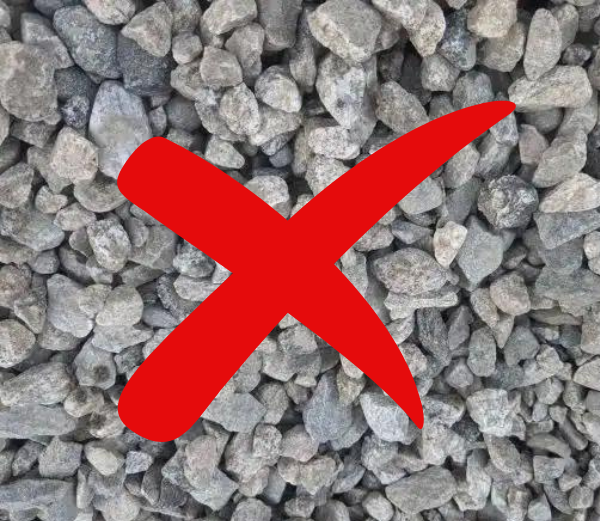 |
| Regular driveway gravel (also known as 57’s) is too big and will not compact nice and flat. Athletic Fields and larger areas may use 57’s as the initial base, which is then topped off with smaller gravel such as 89s. This is really not necessary for simple batting cages. You just need 4 inches of smaller gravel. |
Crusher Run |
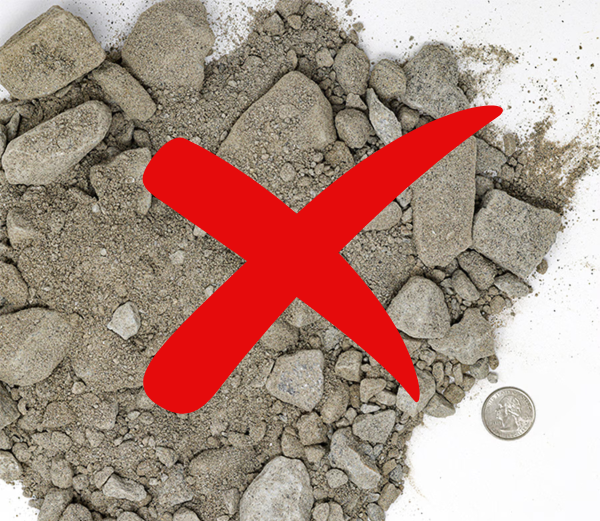 |
| Crusher Run is very common and is gravel combined with fines. But, sometimes the gravel pieces vary greatly and can be too large. This is much harder to compact and get flat. |
|
|
River Rock |
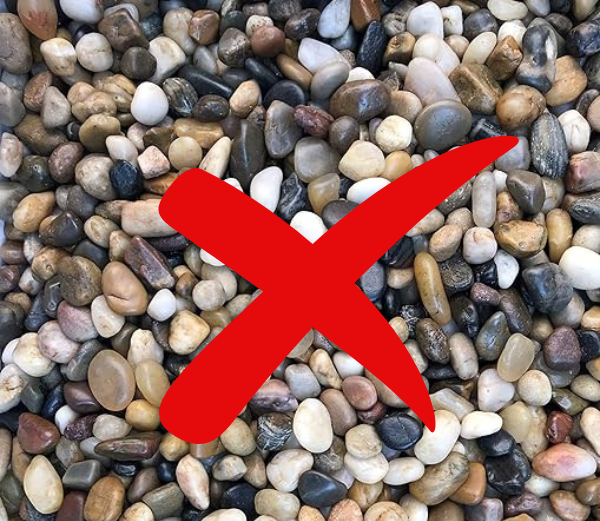 |
| River Rock does not work. People often ask this because they see it at Home Depot or the local nursery. The edges are rounded and it does not compact. |
|
|
Pure “Fines” |
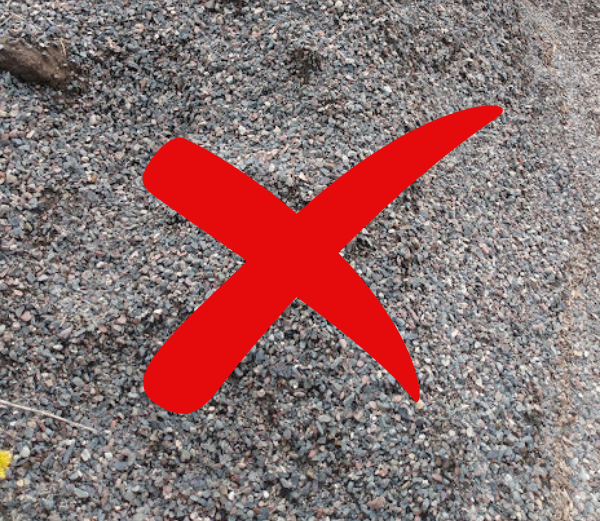 |
| Anything called “fines” just means it’s the dust form of whatever rock it was. While it will compact nicely, pure “fines” of anything don’t drain very well and we don’t use it for sub bases for the same reason we don’t use just “sand.” Its ok if there are fines mixed in with crushed rock base. |
If you are sourcing the material from your local landscape supply store, or quarry, you can typically just go look at the pile and inspect it yourself to see the quality and composition.
The main point of the material is that it allows water to drain through the drainage holes of the turf and through the cracks of the stone, allowing the turf to dry faster.. AND the smaller size will compact nice and flat. You can rent a vibrating tamp from Home Depot for about $20 a day, otherwise you can use a barrel roller filed with water, or just a hand tamp, but that will take much longer.
Other Frequent Related Questions to Cage Sub Bases
How Far Down Should I Dig for the Sub Base of Batting Cage Turf?
If you want the turf to be flush with the rest of the yard, you’ll need to dig 5 or 6 inches into the ground. You’ll need several inches for the rock and an inch or so for the turf. Which we cover next. If you have access to a bobcat, or someone who can drive it, this is quick work with a bucket on a bobcat. You can rent bobcats at many Home Depots these days. Simply scrape the area 5 inches deep and move the dirt somewhere else. Otherwise, get out the shovels!
The other alternative is to have a raised “curb,” which you would have to build. In that case, you may not necessarily have to dig.
No, You Can’t Roll a Piece of Turf Over Your Existing Grass
Most folks installing batting cages in their backyard start with a grass or dirt area. You can’t simply roll a piece of turf over this because the base underneath the turf needs to be flat and compact. Otherwise the turf will not lay flat and ultimately be a tripping hazard.
No, You do not need to pour a Concrete Base
No. In fact, turf will drain and perform much better over a compacted crushed rock base. It will be softer than a concrete slab. AND it’s much cheaper than pouring concrete. Furthermore, in the future, if the area needs to be transformed back to a grass yard, it’s much easier to convert than removing a concrete slab.
Do I need to put drainage pipes in?
Drainage is a whole other article, so we won’t get into that here. While many turf surfaces really need a drainage system, single batting cage systems rarely need it. It’s only 15’ wide and not big enough to warrant french drains or anything like that. You may want to put a slight crown on your sub-base before you compact it. This just means having the middle be slightly more elevated than the edges, so that water runs out and off the sides a bit faster.
Once you have figured out your sub base, contact ATXTurf to order your batting cage materials. 866-428-2809


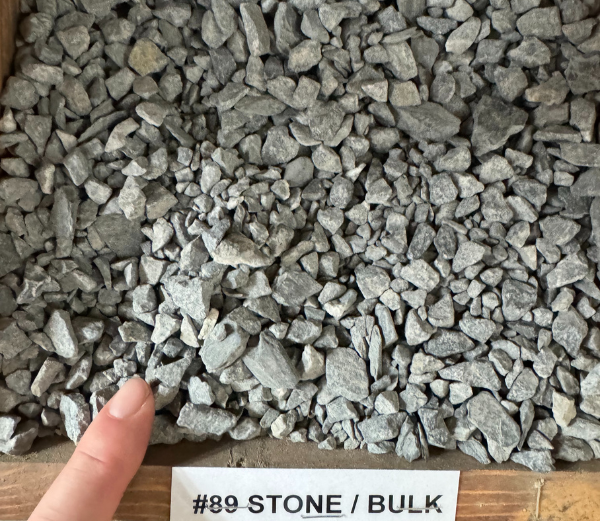
I would like to obtain a quote and anticipated delivery time for a 15 x 15 x 70 batting cage with a #42 net. If you could provide that via email that would be great.
Hi Eric, You should have a quote in your inbox.
Thanks for the inquiry,
The ATXTurf Team
do you sell a 30′ or smaller cages?
Hi Deepak, We can custom make any cage size. The turnaround time will be longer and may cost a few extra dollars.
Thank You,
ATXTurf Team
can I lay the turf down over my existing back portion of my driveway?
Hi Jason, Yes, you can but we’ll DM you with details.
Thanks!
ATXTurf Team